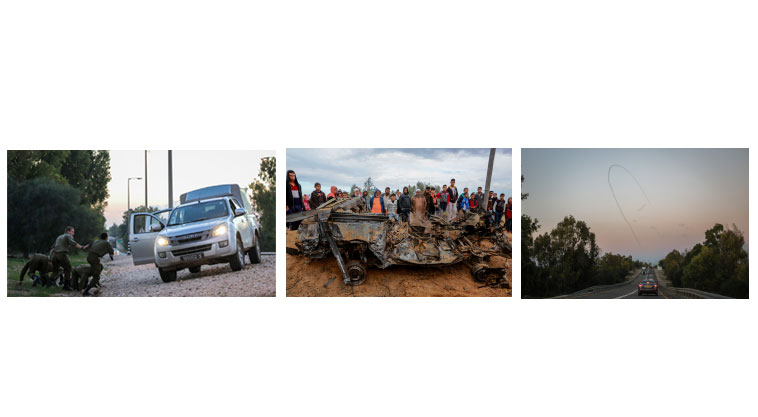Special Operation Gone Awry


Sunday night’s failed IDF operation in the Gaza Strip, which ended with a lieutenant colonel killed in a firefight and another officer moderately wounded, exposed the daring work of special military units operating across the border.
The news has not, for the moment at least, threatened ongoing mediation efforts by Egypt to bring a long-term cease-fire deal to the Hamas-controlled territory.
According to Palestinian media, the firefight and subsequent missile barrage from Hamas occurred when Israel launched a special operations mission to assassinate Hamas Qassam Brigade commander Nour Baraka in Khan Yunis. According to Israeli sources, Baraka was simply a casualty in the firefight. In a statement, the IDF spokesman said the unit had carried out “a prolonged activity” during which it encountered “a most complex reality. The fighters acted heroically and from the moment they encountered this reality, they waged a heroic battle to remove the threat and escape back into Israeli territory.”
A few hours before the incident in Gaza, Prime Minister Binyamin Netanyahu said at a press conference in Paris that “there is no diplomatic solution with Gaza just like there isn’t with ISIS.” He then added, “I am doing everything I can to prevent a needless war.” He noted that Israel’s objective is to preserve civilian security along the Israel border with Gaza, but also to prevent a humanitarian crisis in the coastal enclave.
As it happens, this past Sunday, Qatar completed the payment of July salaries to Hamas employees in the Gaza Strip, after receiving the green light from Israel to deliver $15 million in cash. Under the terms of the agreement, the money will go directly to civilian personnel and not, as Hamas wanted, to police and rescue forces. Likewise, according to a report in Al-Akhbar of Lebanon, Qatar and Israel agreed to the creation of a sea passage between Cyprus and the Gaza Strip whose security would be overseen by Israel and would be internationally administered.
So what were Israeli forces doing deep inside of Gaza territory? Officially, Israel has not provided an answer. But the fact that Gen (res.) Tal Russo, former head of the southern command for the IDF, who does not often give media interviews, chose to comment on the operation suggests that someone was using him to convey a message.
The IDF operation, Russo said, was not a planned assassination. He said that the IDF commando brigade, comprised of many different special units, works entirely out of public view. “These are operations that are carried out all the time, each night, on all fronts,” he said. “It is an operation that apparently was exposed. Not a liquidation attempt. We have other ways of assassinating.” The IDF spokesman, Brig.-Gen. Ronen Manelis, also told the media that the failed raid was not an assassination attempt.
Indeed, it is hard to believe that Israel’s government would order an assassination of a senior Hamas figure at a time when Egypt is attempting to broker a cease-fire. Netanyahu is too deeply invested in those efforts to allow such a thing. More likely is that the mission involved reconnaissance on Hamas military infrastructure or perhaps information relating to Israeli captives and MIAs. In recent years, during the “battle between the wars,” Israel has taken advantage of the chaos in the Arab world to carry out many similar operations across the border. The large majority of these operations are never made public.
Despite the deaths on both sides, and the dispatch of at least 17 mortars and rockets into Israeli territory from Gaza Sunday night (and another barrage on Monday night), Hamas’s response has largely been measured. The organization will certainly try to promote this incident as an achievement — exposing and targeting a special Israeli unit — even as they receive money in suitcases from Qatari sponsors (with Israeli permission) to feed their people.
Worthy of Our Salute
Who is Lt.-Col. M., the Israeli soldier killed in the operation? As of this writing, his identity remains classified. But we do know that he was a 41-year-old father of two from the north.
In a statement, Chief of General Staff Gadi Eizenkot said that the IDF owes Lt.-Col. M. “more than we can talk about.” He further wrote that “his actions will not be publicized in the media, but he is worthy of our salute for the actions that he conducted, this one and others, that gave Israel an upper hand over its enemies.”
Further, Prime Minister Binyamin Netanyahu called M. a “praiseworthy fighter.”
“The day will come when his full heroism will be publicized,” he said. “Israel’s citizens owe him a tremendous debt.”
In a conversation with Mishpacha, former chief of general staff Benny Gantz said M. and the officer who was injured are “truly from the best sons and citizens of this state. We need to be proud that we have such people.”
(Originally featured in Mishpacha, Issue 735)
Oops! We could not locate your form.













